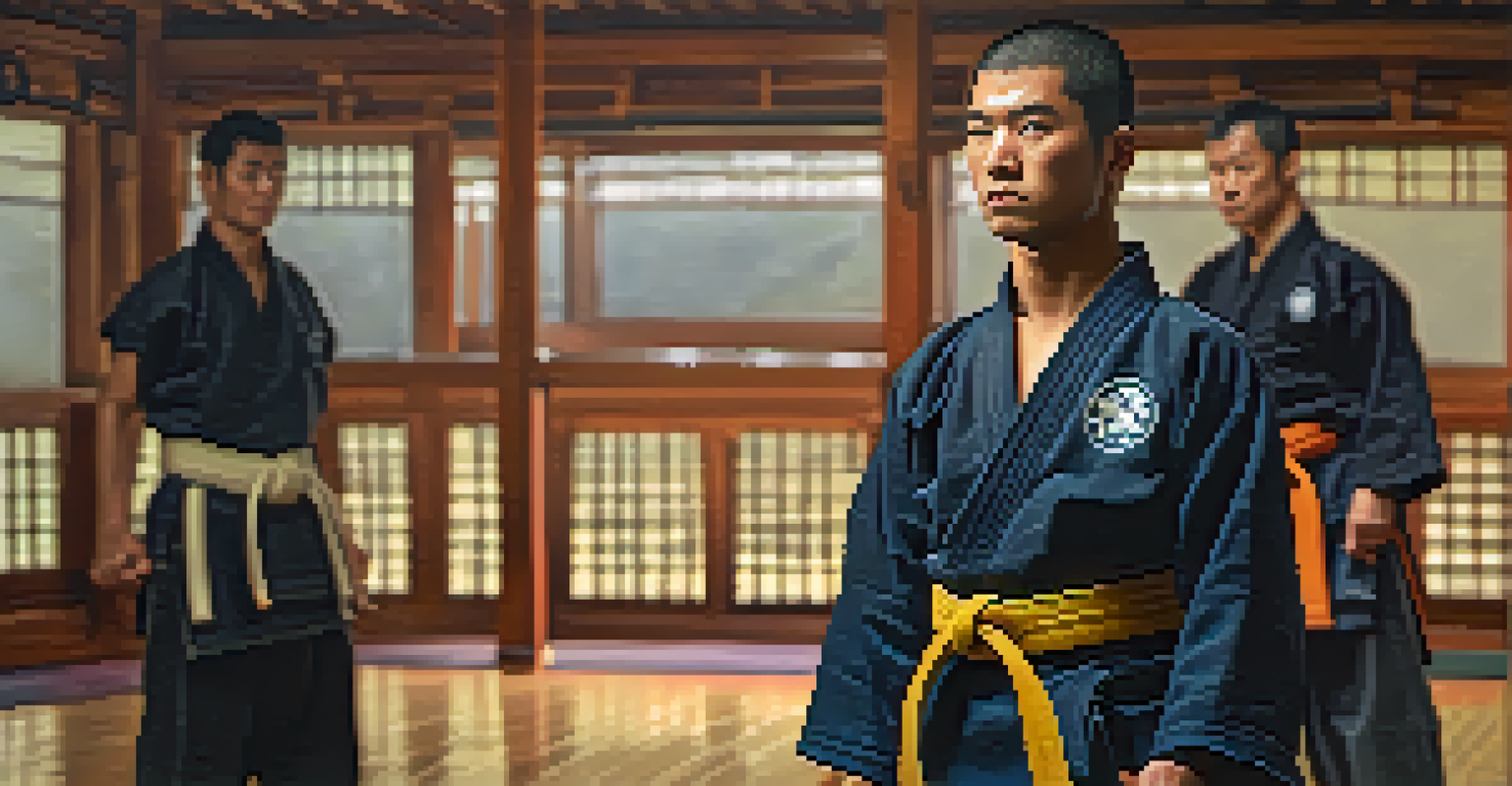Sun Tzu: The Art of War's Influence on Self Defense Tactics

Understanding Sun Tzu and His Timeless Wisdom
Sun Tzu, an ancient Chinese military strategist, penned 'The Art of War' over 2,500 years ago. His insights delve into strategy, tactics, and the psychology of conflict. While the text primarily addresses warfare, its principles are surprisingly applicable to everyday situations, including self-defense. By grasping Sun Tzu's teachings, individuals can find valuable lessons that resonate in our modern lives.
The greatest victory is that which requires no battle.
The core idea of Sun Tzu's philosophy is to know oneself and one's opponent. This concept encourages self-awareness and understanding of one's environment, which are crucial in self-defense scenarios. For example, recognizing your strengths and weaknesses can significantly influence how you respond to a potential threat. This knowledge empowers individuals to make informed decisions when faced with danger.
Additionally, Sun Tzu emphasizes the importance of preparation and planning. By applying this principle, one can train in self-defense techniques, study potential threats, and develop strategies to avoid confrontation. This proactive approach not only enhances personal safety but also instills confidence in one’s ability to handle various situations.
The Value of Deception in Self-Defense
One of Sun Tzu's famous tenets is, 'All warfare is based on deception.' This idea suggests that misleading your opponent can create openings for successful maneuvers. In self-defense, this translates to using feints or acting in a way that confuses an aggressor. For instance, pretending to retreat can lure an attacker into a vulnerable position, allowing you to counterattack effectively.

In real-life situations, deception can also manifest in body language and verbal communication. A calm demeanor and confident posture can deter potential threats by signaling that you are not an easy target. This subtle form of deception can influence an aggressor's decision-making process, potentially diffusing a tense situation before it escalates.
Know Yourself and Your Opponent
Self-awareness and understanding of your environment are crucial for making informed decisions in self-defense situations.
Moreover, employing unpredictability in your actions can keep opponents off balance. Just as a general might change tactics mid-battle, a self-defender can adapt their responses based on the aggressor's behavior. This fluidity not only enhances physical safety but also fosters mental resilience, reinforcing the idea that adaptability is key in self-defense.
The Importance of Strategic Positioning
Sun Tzu famously stated, 'Positioning is key to victory.' This principle is critical in self-defense situations, where your physical position relative to an aggressor can determine the outcome. For example, positioning yourself with your back against a wall minimizes the risk of being ambushed from behind. Such awareness of your surroundings can significantly enhance your defensive capabilities.
In the midst of chaos, there is also opportunity.
Moreover, understanding the terrain or environment can provide an advantage. Whether you're in a narrow alley or a crowded area, knowing how to use available space can be vital. This could mean using obstacles to shield yourself or creating distance to evade an attack. Strategic positioning is not just about physical space; it’s also about mental clarity and quick decision-making.
In essence, effective self-defense requires a keen awareness of both your environment and the dynamics of the situation. By mastering the art of positioning, you can control encounters more effectively, ensuring that you are always in the most advantageous place to protect yourself.
Timing: The Key to Effective Responses
In 'The Art of War,' Sun Tzu speaks to the significance of timing in achieving success. In self-defense, timing your actions can mean the difference between evasion and confrontation. For instance, waiting for the right moment to strike or retreat can lead to a more favorable outcome. This principle encourages individuals to stay calm and composed, allowing them to assess situations accurately.
Furthermore, recognizing the rhythm of an encounter can provide insights into when to act. Just as a skilled martial artist anticipates their opponent's moves, a self-defender can learn to read body language and cues. This heightened awareness can help in predicting an aggressor's actions, allowing for timely responses that could prevent escalation.
Adaptability Is Key in Defense
Being able to adjust tactics based on changing circumstances enhances your effectiveness in unpredictable self-defense scenarios.
Ultimately, mastering the art of timing enhances one’s ability to respond effectively in critical situations. It cultivates patience and strategic thinking, vital components for anyone looking to improve their self-defense skills.
The Role of Adaptability in Defense Strategies
Sun Tzu's emphasis on adaptability is crucial for successful self-defense. The ability to adjust tactics based on changing circumstances is essential, especially in unpredictable situations. For example, if an initial plan to evade an attacker fails, being able to quickly pivot to another strategy can make all the difference. This mindset encourages practitioners to think on their feet and remain flexible.
Moreover, adaptability also encompasses the incorporation of various techniques and disciplines. Many self-defense systems draw from multiple martial arts, allowing individuals to respond effectively across various scenarios. This blend of skills not only enhances adaptability but also enriches an individual's overall defensive capabilities.
In essence, embracing adaptability in self-defense training fosters resilience and creativity. By cultivating this trait, individuals can better navigate the complexities of real-life encounters, turning potential threats into opportunities for de-escalation and safety.
The Psychological Edge: Mindset and Confidence
Sun Tzu understood the psychological aspects of conflict, asserting that 'the greatest victory is that which requires no battle.' In self-defense, a confident mindset can often deter potential threats before any physical confrontation occurs. When you exude confidence, attackers may perceive you as a more formidable challenge, prompting them to reconsider their intentions.
Additionally, fostering a positive mental attitude can aid in better decision-making during high-stress situations. Training not only physical skills but also mental resilience prepares individuals to remain composed under pressure. This dual focus enhances overall effectiveness in self-defense, allowing for clearer thinking and quicker reactions when faced with danger.
Confidence Deters Potential Threats
Exuding confidence can often prevent physical confrontations by making you appear as a formidable challenge to potential attackers.
Ultimately, cultivating a strong psychological edge is essential for self-defense. By integrating Sun Tzu's insights into mindset and confidence, individuals can empower themselves to face threats with courage and clarity.
Conclusion: Integrating Sun Tzu’s Wisdom into Self-Defense
The teachings of Sun Tzu in 'The Art of War' resonate deeply within the realm of self-defense. By understanding and applying his principles—such as deception, positioning, timing, adaptability, and psychological readiness—individuals can enhance their defensive strategies. These timeless insights create a comprehensive framework for navigating potential threats in today’s world.
Moreover, integrating these philosophies encourages a proactive approach to personal safety. Rather than merely reacting to danger, individuals can adopt a mindset that prioritizes awareness, preparation, and adaptability. This shift not only improves self-defense skills but also fosters a sense of empowerment in everyday life.

In conclusion, Sun Tzu’s wisdom transcends the battlefield, offering invaluable lessons for those seeking to protect themselves. By embracing these strategies, individuals can cultivate a robust foundation for self-defense, ultimately leading to greater confidence and security in their daily lives.